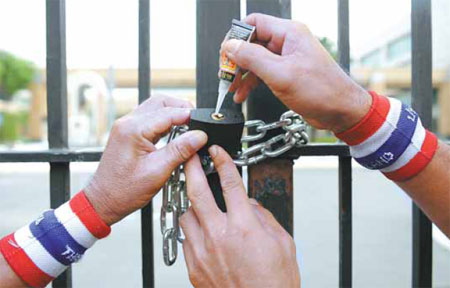Thai PM leaves Bangkok as violence puts toll at 20
|
Anti-government protesters lock the gates of the Thai Ministry of Foreign Affairs with chains and seal the lock with glue during a demonstration in Bangkok on Monday. Manjunath Kiran / Agence France-Presse |
Yingluck's office tells media to follow a convoy to find her
Thai Prime Minister Yingluck Shinawatra, the target of anti-government protesters who have blocked parts of Bangkok for weeks, has left the city and is staying 150 km away, her office said on Monday, without specifying the location.
The protests, punctuated by occasional gunfire and bomb blasts, including one on Sunday that killed a woman and a young brother and sister, are aimed at unseating Yingluck and erasing the influence of her brother, former premier Thaksin Shinawatra, who is seen by many as the power behind the government.
A total of 20 people have been killed and 718 injured in the political violence since Nov 30, according to the latest figures released on Monday by the Bangkok Metropolitan Administration's Erawan Emergency Medical Service Center.
Yingluck's office told reporters she was not in Bangkok and asked media to follow a convoy outside the city to where they said Yingluck was "undertaking official duties".
The office would not confirm how many days Yingluck had been working outside the capital. She was last seen in public in Bangkok nearly a week ago, on Feb 18, and is due to attend a corruption hearing there on Thursday.
Thai Foreign Minister Surapong Tovichakchaikul said Yingluck would hold a Cabinet meeting on Tuesday.
"It is highly likely that we will hold the Cabinet meeting outside Bangkok. As for the prime minister's exact whereabouts today, I have not been informed," Surapong told reporters.
The political crisis, which has already pitted the mainly middle-class anti-government demonstrators from Thailand and the southern region against supporters of Yingluck from the populous rural north and northeast, shows no sign of ending soon.
But the army, which toppled Thaksin in 2006 in the latest of 18 coups or attempted coups since Thailand became a constitutional monarchy in 1932, said it would not intervene this time around.
"Somebody has to take responsibility but that doesn't mean soldiers can intervene without working under the framework (of the law)," army chief Prayuth Chan-ocha said in a rare televised address.
"How can we be sure that if we use soldiers, the situation will return to peace?"
Protesters, who disrupted and boycotted this month's general election, have been urged by their leader to target businesses linked to Thaksin and gathered outside a television station on Monday managed by Thaksin's son.
They also headed for the foreign and finance ministries.
The Election Commission had said it would try to complete the election process in late April, but has since suspended that date pending a court decision, leaving the country in limbo under a caretaker government with limited powers.
It was not immediately clear who was responsible for Sunday's bomb blast in a busy central shopping district.
The 6-year-old sister of a boy killed in the attack died on Monday, doctors said, raising the death toll to three.
Each side has accused the other of instigating violence, while armed provocateurs have a history of trying to stir tension. Protesters and the police have blamed violence on shadowy third parties.
Yingluck described Sunday's attack, and one on Saturday in the eastern province of Trat in which a 5-year-old girl was killed, as terrorism.
Reuters-Xinhua



















